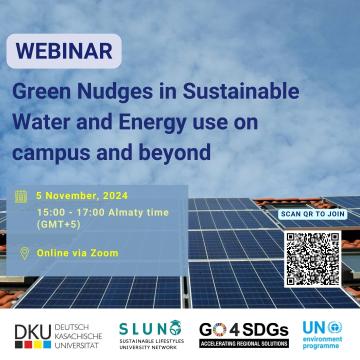
5 November 2024 (Tuesday)
15:00 - 17:00 Almaty time (GMT+5), 11:00 - 13:00 CET
Zoom link to the webinar: https://us06web.zoom.us/j/87174724265?pwd=B5rjv92mv9D3vFihRsXWt4sQi3npaH.1
Background
Energy systems drive economies and sustain societies. However, the transformation and use of energy is the single biggest contributor to global warming. The energy sector, dominated by fossil fuels, accounts for 34 percent of human-caused greenhouse gas (GHG) emissions. Our challenge is to reduce our reliance on fossil fuels to source our electricity, supply our heating and cooling needs, and power our industry and transportation, by accelerating the transition to sustainable and affordable energy for all.
Coupled with sustainable energy needs the other burning issue for Central Asia and South Caucasus is water saving. The lack of freshwater due to climate change and inefficient water management poses significant challenges to the countries’ populations and ecosystems. E.g. the World Resources Institute has classified Uzbekistan as one of the most water-stressed globally until 2040, with recurring droughts every five years.
The United Nations Environment Programme (UNEP) promotes the use of integrated approaches to sustainable energy systems, including energy efficiency and the use of renewable energy. UNEP supports developing countries to improve energy efficiency and increase their use of renewable energy, as part of their efforts to achieve low-carbon and climate-resilient development pathways. According to UNEP Information brief (2014 water efficiency is a multi-faceted concept. It means “doing more and better with less” by obtaining more value with the available resources. Together, these efforts and concepts reflect UNEP's commitment to fostering a healthier planet through sustainable development and responsible resource use.
In a 2024 survey, the need in sustainable energy and water saving were identified among the most pressing issues by universities of Central Asia and Caucasus, necessitating urgent shift in behavioral pattern. Behavioral science shows that a simple “nudge” towards everyday greener decisions is a powerful spur to environmental action for students and other campus community members to address these challenges. Techniques such as gentle persuasion, changing the framing of choices, resetting default options or harnessing social influence can all lead towards sustainable conduct and an eco-friendly campus.
The Webinar is a part of activities of UNEP and Kazakh-German University, targeting to support Sustainable Lifestyles on campus and beyond in the countries of Central Asia and Caucasus to reduce the unsustainable use of natural resources through a "net zero living" behavior pattern.
Objective
The Webinar targets to discuss the need and showcase the existing practices of green nudges on sustainable energy and water efficiency applicable in university campuses of Central Asia and South Caucasus.
Participants
Universities, upper/graduate students, sustainable development experts and practitioners, private sector, civil society representatives from the regions of South Caucasus and Central Asia as well as international organizations.
The event will be held online with simultaneous Russian-English translation and provided recording.

